The Business Of Stretching: How Hakika Wise Is Building A Wellness Franchise Empire
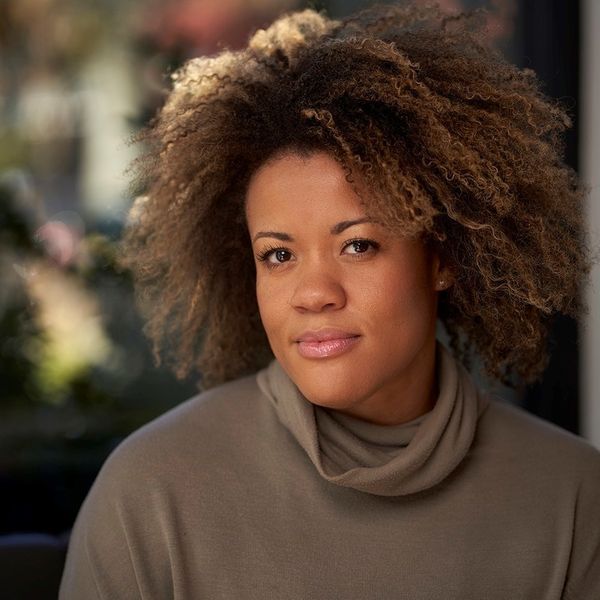
You can be a boss, or you can make future bosses. Hakika DuBose Wise, the founder and CEO of the Kika Stretch Studio franchise, is doing both. In 2011, Hakika used her $500 tax return to start a wellness-based business that spread the gospel of fitness through a very specific niche: stretching.
What makes Kika Stretch Studios so unique is the use of the trademarked KIKA Method -- a form of passive stretching -- where trained stretch coaches follow standardized stretch routines while exerting force on clients to move their limbs into a new position. According to Hakika, a former professional dancer, the benefits to this approach include mental clarity, improved posture, decreased stress and tension, enhanced performance, improved flexibility, and more. The KIKA method is inspired from Hakika's technical training in dance and personal training, the Alexander technique, Laban movement analysis, and advanced anatomy.
While Hakika's entry into entrepreneurship was first fueled by a desire for autonomy and flexibility, her foray into the business of stretching has made her the youngest female franchisor in the US. She is showing female entrepreneurs nationwide that dreaming big doesn't have to just stop at the typical business model. A 2018 Global Wellness report stated that wellness is now a $4.2 trillion industry. According to a 2018 IHRSA report, health club industry revenue totaled $87.2 billion in 2017. Wellness entrepreneurs who are able to tap into the franchise market and grow an enthused, loyal, and paying community have extreme opportunities for growth. Currently, Hakika has six Kika Stretch Studio locations located across New Jersey, and two more in New York City and Dallas, Texas. Nationwide expansion is at the top of her goals list.
Hakika spoke with xoNecole about the early days of the business, why she pursued franchising, her experiences navigating the wellness industry as a Black female entrepreneur, and the power of fueling and support future owners.
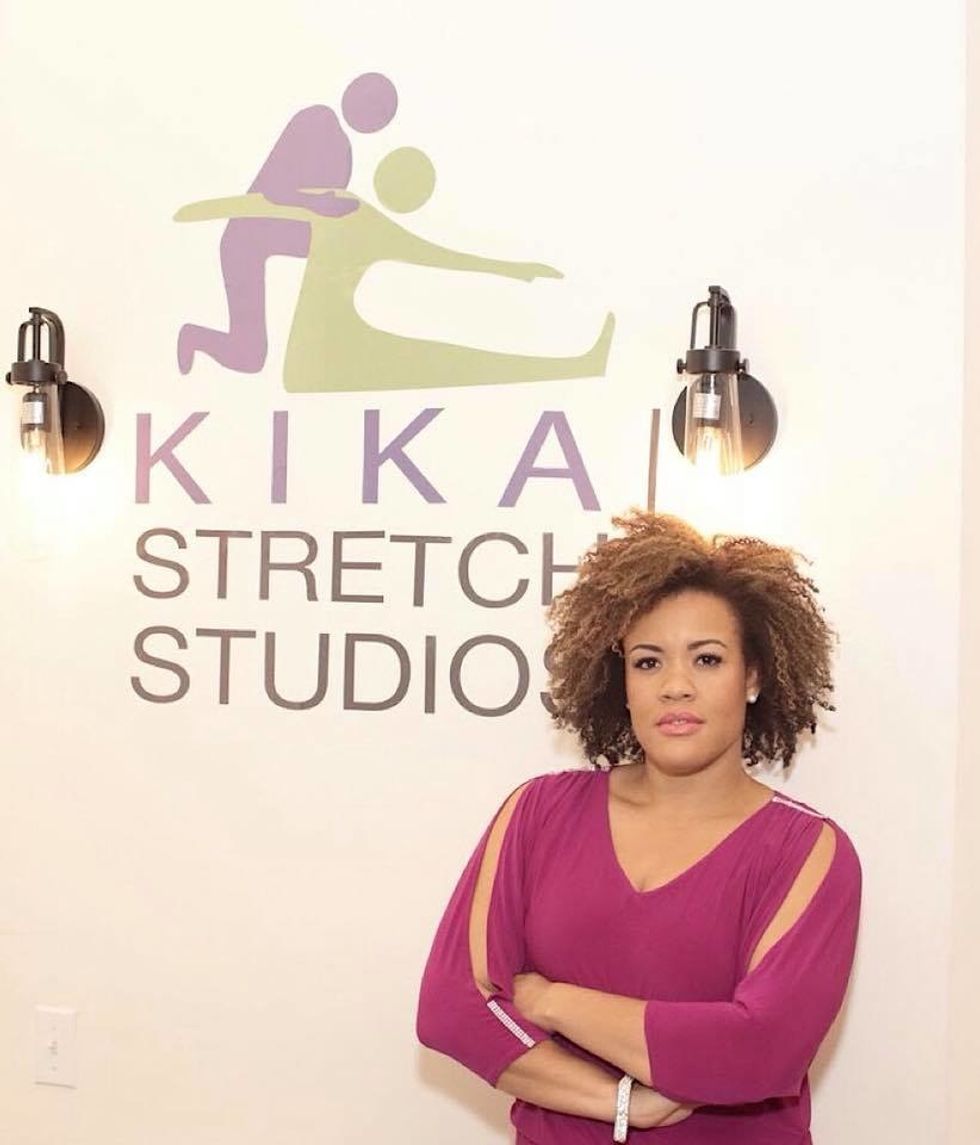
Courtesy of Hakika Wise
What inspired you to launch Kika Stretch Studios?
I trained as a dancer and acted and danced professionally for years. As an undergrad at Montclair State University, I was obsessed with the spine and how it works. I used to always stretch. I was looking for a side hustle and started to stretch bodybuilders. I based it off my own routine as a dancer to keep flexibility. There was a gym right by my house and I knew they needed the service. The owner let me set up shop. I knew I was either going to go back to school or start a business. My son was young at the time and I wanted to do something where I could be part of his life. I told myself that [I would] do this stretching thing. In 2011, I started with one client and I took it from there.
Why is a stretching studio such a unique business idea?
The reason why you should always stretch is that even if you are flexible - stress, bills, husbands, wives, kids - stress you out. It builds tension in the body that cause negative effects. If you never remove that, your quality of life goes down. You should be able to walk through life without feeling anything in your body. Stretch to destress and get rid of those lumps so you can enjoy your life.
How did you market the business early on?
I used guerrilla marketing. I handed out posters. I had someone dress up as a Gumbi. For the first year, I read books on business. Specifically, Guerilla Marketing by Jay Conrad Levinson. I used a lot of those guerilla marketing tactics and they worked. I started with only $500. My rent was $350 and I printed out brochures from Staples. I bought a $25 ball and mat. That's all I needed. People started calling from other areas. My first location was in Montclair, NJ. I started opening up other locations but I quickly realized I didn't want to be responsible for [everything] by myself. That's when I started thinking about franchising. It's not a model that many entrepreneurs consider.
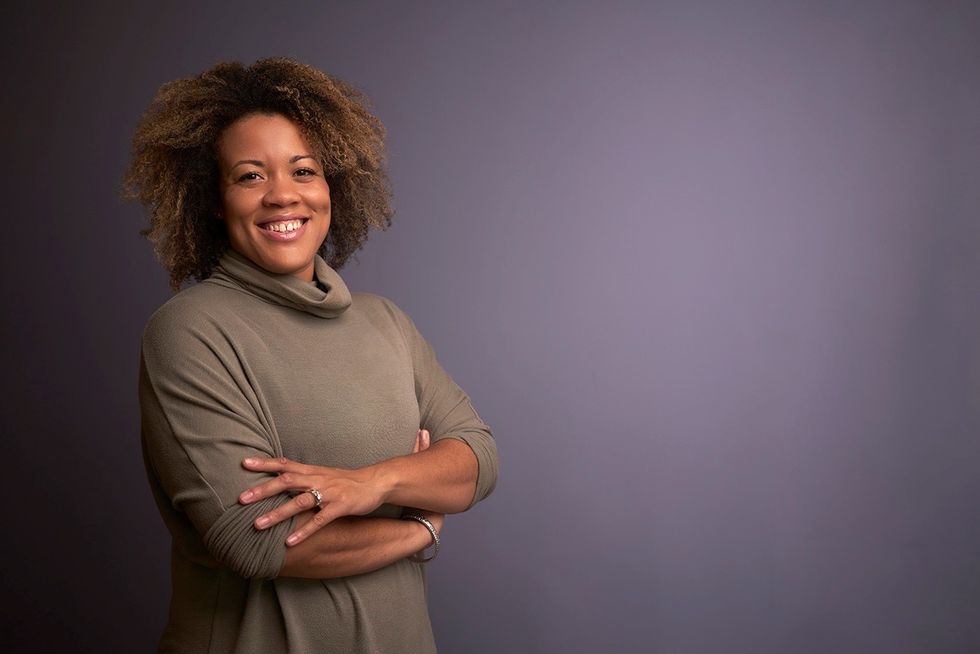
Courtesy of Hakika Wise
"I used a lot of those guerilla marketing tactics and they worked. I started with only $500."
How did you put the franchising dream into motion?
I realized that what I'm building was legitimate. I had overcome a lot of past mistakes by then. For example, my Montclair, NJ location caught on fire two years ago. We were closed for nine months. I had to move to the church on the corner. Our clients went from storefront to the basement of a church. We lost some people. We also gained new clientele that stayed and still come. I knew the method was strong. You can do it anywhere. It's not about the space. I knew I had something I could build off of. It gave me more confidence to franchise.
One day in 2018, I was in Barnes & Noble and said I was going to Google the top franchise consulting firms. I reached out to five. The first person who responded happened to be the person I went through the whole process with. He was on a flight the next week just to meet me. He explained the [entire] process. He has a big company and that's what they do. He had a legal team and contacts I could use under his umbrella. He got in and directed me on exactly what I needed to do. I studied that for six months.
[Franchising] is typically an expensive process but his company positions themselves competitively so they get more people. Finding the right people to use and shopping around is very important.
How did you get your first franchisees?
I originally had two locations. The first franchise location was bought by a manager who was running my first location. She was so phenomenal. I didn't want to cap her potential. She needed to grow. The people I was working with told me that I could have my manager franchise the first location because she already knows the system. I met with her and her husband and offered it to them. They decided to go for it.
I started realizing if I went after people who were 9-5 workers, millennials - typically the people who would never be considered to franchise by other companies...if I went after those hungry people, they would do it. This is why all of our franchises (except for one) are minority-owned and run by millenials. This doesn't exist.
I try to change the lifestyle of the franchisees. We have corporate people who are high on the ladder but realize there is a glass ceiling. For example, their retirement plan may not be what they think it is. No one has assets anymore. As soon as you sign on the dotted line of a [Kika Stretch Studio], you own an asset which is huge. It will benefit you and your family.
If you're used to the corporate world, you've [probably] gained skills that will help you run your own business. It's just that no one else has given you the opportunity because you're not an ideal [franchisee] candidate. We look past that.
At this point, I stay up at night thinking about how I can make sure the franchisees are doing the right thing so that they can make money. Their success is my success. That's when I feel like I've done my job.
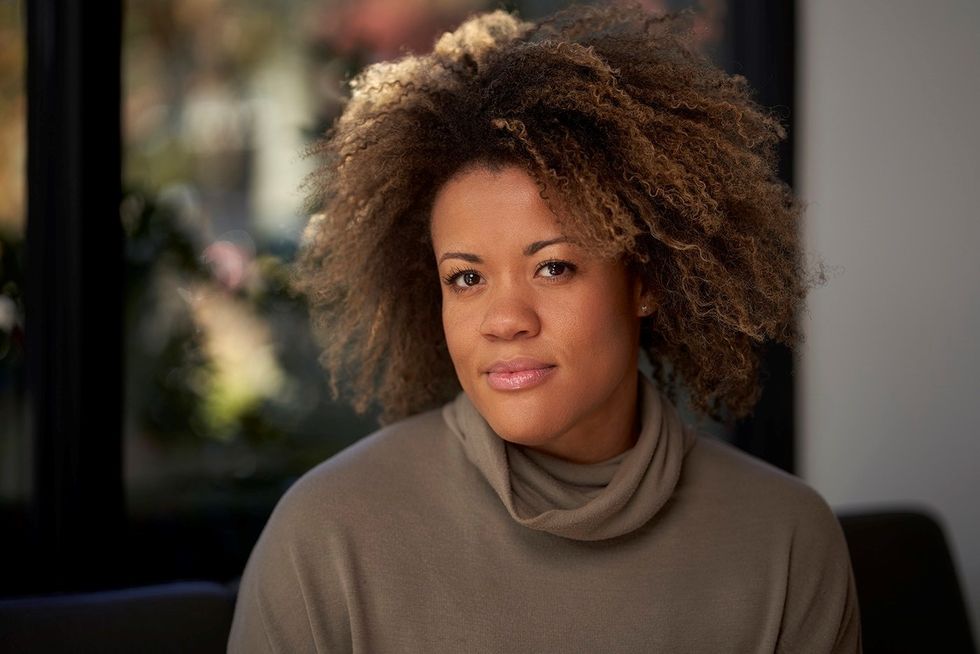
Courtesy of Hakika Wise
"I started realizing if I went after people who were 9-5 workers, millennials...if I went after those hungry people, they would do it. This is why all of our franchises (except for one) are minority-owned and run by millenials. This doesn't exist."
What is like being a Black woman in the wellness franchising space?
It's very lonely and frustrating at times. You realize how much this industry lacks diversity. Franchising, health and wellness are not diverse. Everyone knows it's harder to access capital as a Black woman, but I've never sought it or wanted it. Now, at this point, people come to me and say they want to partner. They want to buy the business or buy into it but not offer much. I say no because it's not just about the money [to me]. What are you adding? I can't be bought. People look at me and see the brand as an opportunity.
When I ask for a mentor it's hard because [people are] like, "Mentor?" Most of the people I've come across being in this position see me as young and don't think I know what I'm doing. When they realize I do, it's too late because they've already shown themselves.
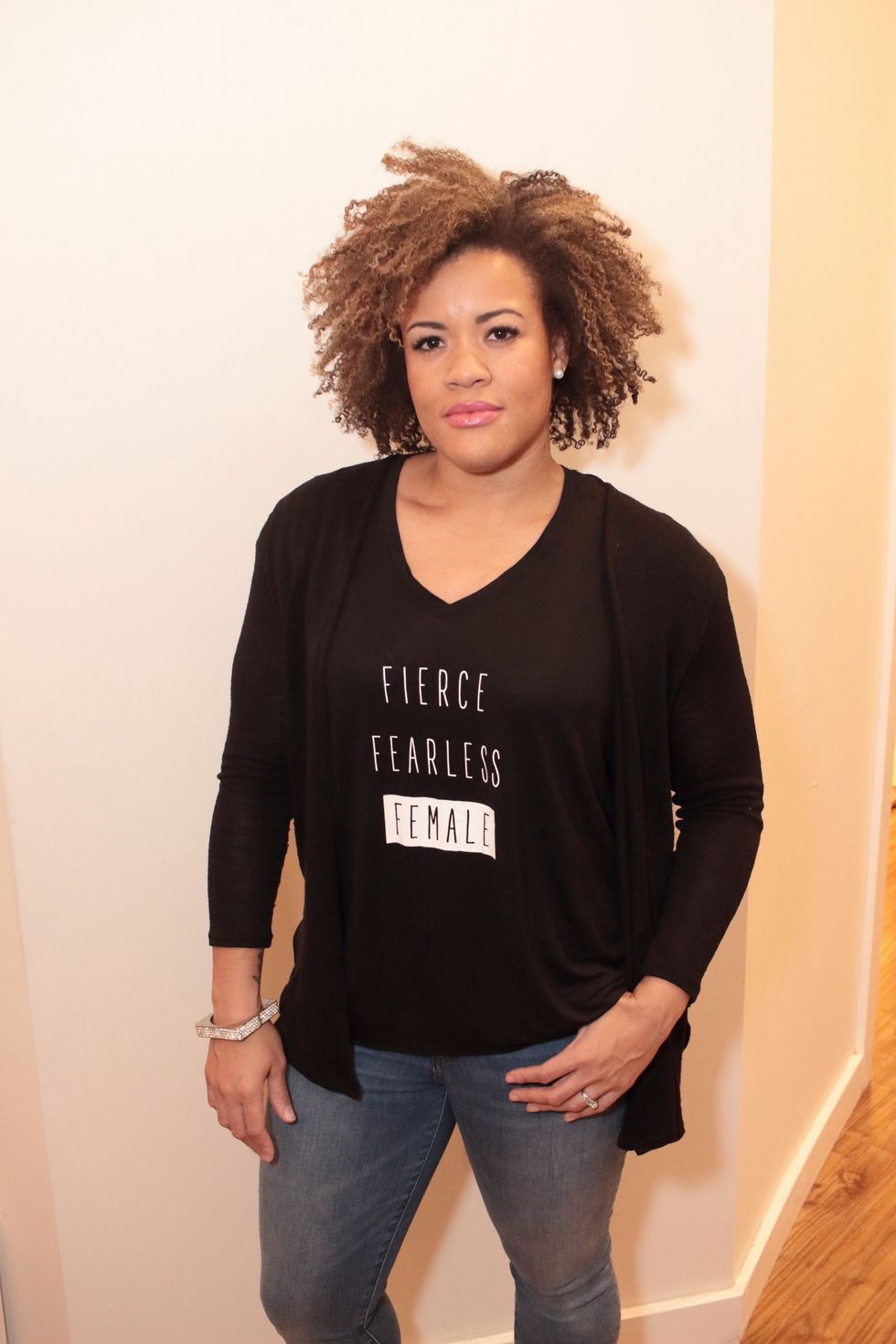
Courtesy of Hakika Wise
"Franchising, health and wellness are not diverse. Everyone knows it's harder to access capital as a Black woman."
Why is developing and systemizing so important to your process as an entrepreneur?
I was doing everything by myself. I read a book called The E-myth Revisited and it said you have to fire yourself from things [to] run a business. I had to delegate. When I hired my first person, I had to start creating a manual so I could teach them. As I fired myself from different things, I had to write down what they had to do. That became the essence of my franchise. I already had all the paperwork [and processes].
Why is learning sales so important?
As a dancer and actor, I was always selling myself. In order to be good at selling, you have to know what you're doing it for. What's your reason for doing it? Do you have to feed your family? Do you have a project that you want to pursue? For me, it's about helping people and not just convincing people to do something that doesn't work. As long as you help people do something, you'll always be good.
I originally started this business for my son so I could be in his life. Now he's nine and I want to show other people that they can do it too. That's how I've gotten franchisees. There's nothing special. I just didn't stop.
How important is self-care as an entrepreneur?
You [need it]. You'll run yourself down. At one point, I was putting all these things in front of me. Who's taking care of me? Now, I make it an effort. I'll disappear and go to a spa for a self-care day. Sometimes I'll even just go and buy socks.
What marketing strategy has been extremely helpful to your growth?
It starts with the people that you hire, especially in the service business. Hire happy people, people who are good with people, and people who love life. That's what people are attracted to. A lot of people open up businesses and sit behind their desks. Put yourself out there. Show the public that you can help them.
What’s the larger vision for Kika Stretch Studios?
I want to pass this off to my children. I argue about this with my husband all the time. Sometimes I'm like, "Maybe I'll sell it." He'll say no! That's another thing we have to do more of - holding onto things and keeping them for future generations. Even if my kids don't want to do the stretching business, the platform is here. I can pull from it and help them do what they want. They can be internally funded by me instead of someone else.
I am also looking for new franchisees. We're done with New Jersey and are opening two locations in Brooklyn in the summer. We're also opening Dallas, Atlanta, and Florida before the year is out. We're expanding naturally and looking for people who want an opportunity so we can guide them into ownership. We turn employees into employers.
For more of Hakika, click here to check out a Kika Stretch Studios near you.
Your December 2025 Monthly Horoscopes Are All About Surrender & Alignment
December is about letting go. We end the year with the need for more peace, reflection, and rejuvenation, and that is exactly what December is providing for us. The Sun is in Sagittarius, and anything is possible. This is the month to believe in that and to know that the universe is supporting you. With a Supermoon in Gemini as we begin the month as well, we have an opportunity to gain the closure we have been looking for this year and to wrap up old projects, ideas, and communication breakthroughs.
This is the month to make your peace the priority and let go of trying to control the way the tides are turning. Trust in your new beginning, and give yourself time to prepare for it this month.
A big part of the clarity that is coming through this month is due to Neptune going direct in Pisces on December 10, after being retrograde here since July. With Neptune now direct, we are able to see our inspiration and creativity a little more clearly, providing the perfect energy for dreams and manifestation to be built upon. The smoke is clearing, and it’s up to you to decide what you want to do with this newfound clarity that this transit is bringing. Mercury also moves back into Sagittarius on December 11, which is great for communication and clarity, and the adventures you were trying to see through at the beginning of November come around for you again with greater purpose and support.
On December 15, Mars enters Capricorn until the end of January 2026, and this is the extra push we need to make important changes and to be on the path towards greater abundance, stability, and prosperity. Mars in Capricorn takes care of business, and we have extra energy at our disposal during this time to do so. This transit is an ideal time to focus on your career or financial goals for next year and to start putting some of these plans into motion now. A few days later, we have the New Moon of the month, which will be in Sagittarius on December 19, and this is the perfect New Moon to manifest.
The energy is high, magic is in the air, and it’s all about moving forward with the new beginnings that are inspiring you and bringing you joy to think about right now.
Capricorn Season officially begins on December 21, and this earth sign energy is how we heal, gain closure, and build new foundations in our world. With Venus also moving into a Capricorn a few days later, there is something about peace, prosperity, and security that we are gaining in life and in love as we close out the year, and this is what we need right now. This month is about reflecting on what was, letting go of old hurt, and renewing. December is an ending and a new beginning in one, and there is magic in this space to be created.
Read for your sun and rising sign below to see what December 2025 has in store for you.
 AriesKyra Jay for xoNecole
AriesKyra Jay for xoNecoleARIES
December is a full-circle moment for you, Aries. You are seeing the gifts in your world and have a lot of gratitude for the way things have come about for you as of late. There are culminations in your world that are providing you with more abundance, stability, and community, and you are exactly where you are meant to be this month. With the Sun in a fellow fire sign and in your 9th house of travel for most of the month, December is a good time to get out of your comfort zone, explore the world around you, and get your body moving.
Mars, your ruling planet, also makes a change and moves into Capricorn on December 15, which will fuel your inspiration and power in your career space. You are making a lot of professional progress as we close out the year; however, make sure to be more mindful of your competitive drive right now. The New Moon on December 19 is the perfect opportunity for you to create some new plans and goals when it comes to traveling, education, and where you want to gain some new inspiration in your world. Overall, this is a month of things coming together for you serendipitously.
 TaurusKyra Jay for xoNecole
TaurusKyra Jay for xoNecoleTAURUS
December is about trusting your intuition, Taurus. You have a lot on your mind this month, and it’s best to delegate, communicate, and allow yourself some relief by opening up to someone and not feeling like you have to hold everything in. As we begin the month, we have a Supermoon in Gemini happening in your house of income, and the plans and projects you have been building here come to fruition for you now. This is the time to gain clarity on your financial world and to take a look at what spending habits you want to let go of here as well.
With Venus in your 8th house of shared resources for most of the month, you are doing a cleanse on your commitments, partnerships, and business ventures. You are taking a look at what you want to dedicate yourself to in the future, and what commitments you may need to let go of now in order to be in the space you truly want to be, both financially and within some of your relationship dynamics. Before we end the month, we have a New Moon in this same area of your chart, and it’s time to look at the opportunities that are presenting themselves and to trust your internal guidance system to lead you forward.
 GeminiKyra Jay for xoNecole
GeminiKyra Jay for xoNecoleGEMINI
You are moving forward fearlessly this month, Gemini. December is your month of love, passion, and dignity, and you are owning the light that you shine. We begin the month with the last Supermoon of the year, happening in your sign, and you are stepping up to the plate. You are showing up, owning how much you have grown this year, and allowing yourself to heal while also acknowledging that you have done your best and you deserve to have fun in the midst of the changes you are creating.
Mercury, your ruling planet, is officially out of retrograde, and you can use this energy to the fullest potential now. With Mercury in your 7th house of love, it’s time to speak from the heart and to talk about the things that matter and that are inspiring you right now to your loved ones. You never know what kind of epiphanies you may have when you open up the conversation to others. Before the month ends, you have a New Moon in this same love area of your chart, and this New Moon is all about manifesting romance, commitment, and abundance in your world.
 CancerKyra Jay for xoNecole
CancerKyra Jay for xoNecoleCANCER
December is an opening for more love, more joy, and more freedom in your life, Cancer. You have come to a place where you hold so much gratitude in your heart for where you are today and where your heart is shining, and things come together for you with more ease right now. With the Sun in your 6th house of health, work, and daily routines for most of the month, you are getting your ducks in a row while also putting more energy and effort into taking care of yourself, your priorities, and your well-being. This month surprises you in many ways, and it’s because you are showing up.
Mars and Venus both move into your house of love, relationships, marriage, and abundance this month, and you are making strides in your love life. You have both of these opposing forces on your side and are being recognized for the love you are while also receiving the love you want. This month, overall, is about focusing more on the positives in your world and letting your heart have its joy. Before December comes to an end, there is a New Moon in Sagittarius, and this is the perfect opportunity to create the plans you want to see through next year, especially when it comes to your work life, colleagues, business ventures, and health.
 LeoKyra Jay for xoNecole
LeoKyra Jay for xoNecoleLEO
The scales of karma are balancing, and they are balancing in your favor this month, Leo. December is your month of truth, and of seeing it clearly in your world. The Sun is in your house of romance, pleasure, and happiness for most of the month, and it’s time to relax, be in the present moment, and allow what is meant to be, to be. With a Supermoon in your 11th house of manifestation as December begins, this is a powerful month for seeing your dreams come to fruition, and for feeling like the intentions you have set this year are finally here for you now.
Mars also moves into your 6th house mid-month, and this is the perfect energy to have to move into the new year. You have extra energy at your disposal right now and are feeling fearless with what is possible for you and your daily routine. Before the month ends, we also have a New Moon in a fellow fire sign, Sagittarius, and this is a breakthrough moment for you and your heart. December, overall, wants to show you how loved and supported you are and will be doing so in magical, unexpected, and concrete ways.
 VirgoKyra Jay for xoNecole
VirgoKyra Jay for xoNecoleVIRGO
December is a month of victory, Virgo. You are showing up and experiencing some new successes in your world that move you forward on your path in life. With a Supermoon in your 10th house of career as we begin the month, the effort and intentions you have made this year come into full bloom, and you are being recognized for who you are and the good work you have done. This month is all about showing up and allowing yourself to be seen and loved, knowing that you deserve the support and opportunities you are receiving.
Mars moves into Capricorn on December 15, which brings the passion and excitement into your love life, hobbies, and little pleasures in life that light you up. You want to have fun this month and are going to be walking into the new year with this fearless, happy, and spontaneous energy within you. Before the month ends, Venus also enters Capricorn, and in this same area of your chart, you have a lot to look forward to and believe in right now. Overall, December wants you to be happy and will be doing everything possible to make that happen for you. This is your month to shine, Virgo.
 LibraKyra Jay for xoNecole
LibraKyra Jay for xoNecoleLIBRA
December is a month of opportunity for you, Libra. New doors open, and you are financially making breakthroughs this month because of it. December begins with a Supermoon in your 9th house, and you are getting a clearer view of where you have been making strides in your life and how it has all brought you here to this present moment of freedom. This month is showing you what happens when you are fearless with your purpose and when you believe in yourself and what you are worthy of.
Moving further into December, Mars moves into your 4th house of home and family mid-month, and you are closing out the year in your safe spaces. You are spending more time with your loved ones and taking the time to quiet your mind and listen to what your heart has been telling you. Before the month ends, we have a New Moon in Sagittarius, happening in an area of your life that deals with communication. This is a great time for getting the answers you have been looking for and for feeling more clear-headed and confident about the decisions you are making as you move into the new year.
 ScorpioKyra Jay for xoNecole
ScorpioKyra Jay for xoNecoleSCORPIO
Patience is a virtue this month, Scorpio. December is all about remaining patient and vigilant with what you are creating in your world, and knowing that the universe has your back. It’s time to be reminded of the power of hope, and this month is an opening to greater clarity in your life. There is a lot of energy in your financial zones right now, and this is providing you with new opportunities and new insight; however, the speed at which things come about for you may feel daunting. Keep your head up and eyes focused on what you want and know that you are more than worthy of receiving it.
With Mercury in your 2nd house of income this month, December is a good time to plant new seeds and to think about where you want to be financially a month from now or even a year. This month is asking you to think bigger and to think more long-term so that you can set the appropriate plans into motion now. We also have a New Moon in your house of income before the month ends, and this is when you will see more of your dreams come to fruition in this area of your life, and have more opportunities to build. Overall, December will be teaching you a lot, Scorpio.
 SagittariusKyra Jay for xoNecole
SagittariusKyra Jay for xoNecoleSAGITTARIUS
Sagittarius Season is here, and there is a lot in store for you this month, Sag. December is all about what you are dedicating yourself to. It’s about setting your intentions and putting the work in to back up your dreams, and about getting things in order so that when the new beginnings come, you are ready for them. The Sun and Venus are in your sign for most of this month, and there are a lot of eyes on you right now. You have the potential to create a new beginning for yourself, and it’s time to invest in yourself, your love life, and your dreams.
Mercury moves into Sagittarius on December 11, and this is giving you another opportunity to see through some of the plans that you had initiated in November. Mercury was retrograde in your sign last month, and there may have been some disruptions to your vision and plans for the future, and now this energy is turning around for you. Before the month ends, we also have a New Moon in Sagittarius, and you are walking through new doors fearlessly. You are catching others by surprise by your growth this month, and you are thinking a lot about your purpose, future, and plans for the new year.
 CapricornKyra Jay for xoNecole
CapricornKyra Jay for xoNecoleCAPRICORN
December is all about the vision, Capricorn. You are moving through a lot of changes and transformations this month, yet they are giving you a chance at a new beginning in the process. You are focused more on the future and what goals you want to manifest for yourself right now, and are ready to let go of what hasn’t been working for you. With the Sun in your 12th house of closure for most of December, this is your time for healing, but remember, healing doesn’t have to be isolating or boring; you can thrive while you renew, and you are this month.
Mid-month, the excitement picks up for you, and you are feeling more energized than you have in a while. Mars moves into Capricorn until the end of January 2026, and you are being proactive with your goals, intentions, and passions. You are a force to be reckoned with this month, and you are making things happen for yourself with confidence. Capricorn Season officially begins on December 21 this year, and this is definitely speeding up your healing process. You are breaking free from what was, and with Venus also moving into Capricorn before the month ends, you are leaving this year in high spirits and with love opening a new door for you.
 AquariusKyra Jay for xoNecole
AquariusKyra Jay for xoNecoleAQUARIUS
December is all about community, creativity, and manifestation, Aquarius. This is the month to work together with others to help bring your dreams to life. You are in a space of inspiration, empowerment, and beauty, and are creating more of this energy around you and in your world. Look out for what support comes your way this month and know that you don’t have to do everything alone to succeed. With the Sun in your 11th house of manifestation and friendship, your intentions are coming to fruition, and it’s time to celebrate with the people you love and to own how far you have come this year.
On December 19, we have a New Moon in Sagittarius, lighting up your life in all of the best ways possible. This is your New Moon of freedom, victory, and magic, and you are seeing new beginnings appear that you were once just hoping for. Before the month comes to an end, Venus moves into your 12th house of closure, and after an active and successful month, you are ready to relax, heal, and give your heart some of the attention it has been asking for. You are moving into the new year with the need to release and renew what hasn’t been working in your relationships, and you are finally ready to.
 PiscesKyra Jay for xoNecole
PiscesKyra Jay for xoNecolePISCES
December is a big month for you, Pisces. You are making some huge accomplishments this month, and are feeling like everything you have been through this year has been worth it for these moments that are coming to fruition for you now. The Sun is in your 10th house of career and reputation for most of the month, and this is where a lot of your focus is right now. You are claiming your successes and putting yourself out there in ways that not only serve you, but that inspire others as well.
Neptune officially goes direct on December 10, after being retrograde in your sign since July, and you are finally seeing things a little more clearly. You are feeling renewed inspiration and passion in your life, and your intuition is your strongest asset right now. Before December comes to an end, we also have a New Moon in your 10th house of career, and what happens now not only changes things for you in the present, but it also opens new doors and what is possible for you in the new year as well. Overall, you are on top of your game this month and are owning the joy and empowerment you feel.
Featured image by Kyra Jay for xoNecole
I already know that this one is gonna hurt a few feelings. The reason why I say that is because, if there is one thing that (many) folks are going to take if they are looking to get a good night’s rest, it’s melatonin, chile.
How do I know? Well, aside from the fact that some people in my own world are hooked on it, it’s also been reported that as many as 27 percent of Americans rely on this particular supplement to catch themselves some nightly zzz’s. That’s why, when I peeped that a particular study about melatonin was damn near viral, I decided that I absolutely needed to use my side of cyberspace to get the word out.
You see the title of this piece. Unfortunately, it is not an exaggeration. If you give me a moment, I will try to explain what is going on and how you should move, going forward, if melatonin is something that you have been relying on in order to get a good night’s rest.
What Is Melatonin?
 Giphy
GiphyOkay, so what exactly is melatonin? It’s actually a hormone in your system that your body produces in order to regulate your circadian rhythm/sleep cycle. Since melatonin tends to kick in 1-3 hours before you turn in at night, that is actually why “losing an hour” (of sunlight) during this time of the year (check out “Is The Drama Of The One-Hour Time Change All In Your Head?”) can throw off your sleep patterns a bit.
If your body doesn’t seem to have enough melatonin naturally, you might find yourself taking a melatonin supplement in order to increase your melatonin levels, although it should go on record that melatonin is also used to treat seasonal depression; a form of reflux disease (GERD); migraines and headaches; fibromyalgia, and even certain types of anxiety. Melatonin also has a reputation for helping to regulate menstrual cycles and slow down the aging of skin and hair. Something else to keep in mind? When melatonin is in supplement form, oftentimes, it is synthetic, which means that it is made in a lab.
Okay, so clearly, melatonin is needed and, as a supplement, it has its benefits.
Then there is the other side of the story. One that just recently came out.
Why Is the Supplement Currently a Cause for Alarm?
 Giphy
GiphyGeeze. There really is no telling how many times I have shared one of my all-time favorite quotes in my content here: “The excess of a virtue is a vice.” Aristotle is the author and it is so very true — including when it comes to melatonin usage. Because here’s the deal: If you are relying on a melatonin supplement to get some sleep, it’s important to note that most health experts say that you shouldn’t take it for more than 1-2 months, tops.
One reason is because melatonin shouldn’t be a “solution” to your sleep problems, so if you can’t get rest without it after several weeks, it really is time to see your doctor. Another reason is because melatonin supplements do have some potential side effects including nausea, vomiting, irritability, restlessness and disorientation. And then there is what has recently come out about it: the possibility of heart failure and even death.
Wild, right? Here’s the deal about that. Did you know that, according to the American Medical Association, the FDA doesn’t regulate most supplements? So, in the case of melatonin, specifically, while one brand might contain a certain amount of it, another may have a ton more. And when someone uses melatonin, consistently, for 12 months or more, they put themselves at a whopping 90 percent increase of heart failure over those who don’t take the supplement at all (the same goes for individuals who have two melatonin prescriptions filled within 90 days of each other vs. those who don’t). Something else to keep in mind? People (involved in the study) who took melatonin were 3.5 times more likely to be hospitalized for heart failure than those who don’t use the supplement too.
Since this is relatively new research, experts are trying to get to the root of why all of this is the case; however, one cardiologist did say that sometimes insomnia itself is the result of an underlying health issue; sometimes one that has to do with one’s heart. So, taking melatonin might further mask a health problem that needs to be immediately addressed. Sleep apnea is one that he mentioned.
These are pretty alarming results, no doubt. Now does this mean that you should avoid melatonin like the plague altogether? Eh. It’s more like you shouldn’t be using it for more than a couple of months. You should talk to your doctor if you are “treating” your sleep issues with it. And it’s always best to find more natural approaches to getting things that you need into your body. When it comes to melatonin, specifically, I’ve got a few ideas.
Other Ways to Get More Melatonin into Your System
 Giphy
GiphyOkay, so what are some other approaches to getting melatonin into your body?
Eat foods that are high in melatonin. Some of them include almonds, fish, milk (which is why a cup of warm milk tends to help), mushrooms, grapes, pineapples and eggs.
Stay in the light as much as possible during the daytime. Something that I like is for it to be rainy, dark and cold (whatever haters — LOL). That’s why I had to adjust the twinkle lights in my living room during the daytime because your natural melatonin levels react to darkness. So, if you’re in the dark all day, that can have your levels all over the place come nightfall.
Make sure that your room is hella dark. Remember what I just said about darkness? Well, even dim light can suppress your melatonin levels. This includes your phone’s screen, okay? So, when it’s time to go to sleep — the darker your room is, the absolute better.
Go easy on the java. It doesn’t really make sense to drink coffee at night since it’s a stimulant; however, even if it’s your jam throughout the day, 1-3 cups should be your limit and definitely earlier in the daytime. The reason? Some studies reveal that caffeine has a way of lowering your natural melatonin levels.
Have more sex. I don’t know too many people who don’t have a GREAT night’s sleep after sex. One reason why is because certain hormones within the body increase during the act; one of them is — yep, you guessed it — melatonin.
5 Other All-Natural Sleep Supplements to Consider
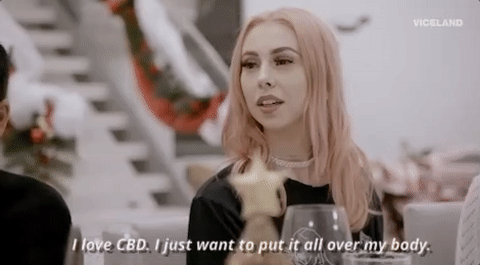 Giphy
GiphySo, now that we’ve unpacked the current issue with melatonin supplements, if you’re wondering if there are any other sleep-based alternatives for you to consider, the answer is “yes” and here are a few of ‘em.
1. Magnesium. Something that I am forever going to be a fan of is the combination of magnesium, calcium and zinc. All work together really well to calm your nerves, so that you can sleep more soundly. When it comes to magnesium, specifically, it helps to regulate your natural melatonin levels while also relaxing your muscles, so that the quality of your sleep improves.
2. Vitamin D. Vitamin D makes the list because there are studies which say that vitamin D deficiencies are linked to certain sleep disorders. This makes sense when you factor in that vitamin D helps to create natural melatonin, it helps to keep your circadian rhythm where it needs to be and it also reduces bodily inflammation (which can also affect sleep patterns).
3. CBD Oil. Although the FDA doesn’t (currently) consider CBD oil to be a supplement, it tends to be marketed as one which is why it also made the list. Since cannabidiol (CBD) is widely used for to bring relief to pain and anxiety, that is why many enjoy using it as a sleep agent as well.
4. Roman and German Chamomile. Did you know that there are different forms of chamomile? Well, the ones that help with sleep (most) are Roman and German. That’s because both contain a flavonoid called apigenin that has a sedative effect to it. When it comes to this suggestion, individuals oftentimes prefer it in tea form.
5. Glycine. If you’ve never heard of glycine before, it’s an amino acid. When it comes to sleeping, a lot of people like it because it’s been proven to help you fall asleep faster, it soothes your muscles and joints and it also helps you to stay asleep once you fall asleep.
____
I know that reading something like this can potentially freak you out. Again, if you’re not downing melatonin like candy and you’re not on it for months and months at a time, you should be fine. If you are on edge, hit up your doctor; they will be happy to explain things further and deeper, I’m sure.
In the meantime, if melatonin is your thing — moderation, please.
After all, the supplement was supposed to be a temporary “fix.” Never a permanent cure.
Which is really what the study is reminding us of.
Let’s make things inbox official! Sign up for the xoNecole newsletter for love, wellness, career, and exclusive content delivered straight to your inbox.
Featured image by Shutterstock









